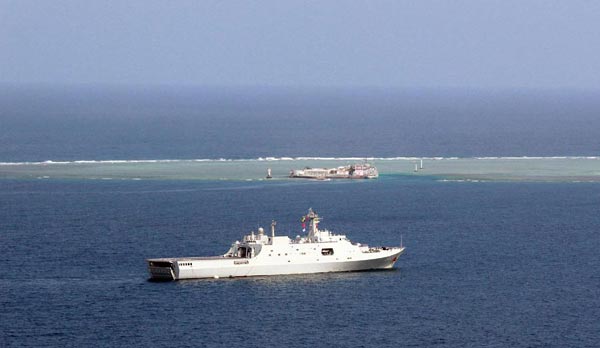China - A staunch proponent of peace and stability in the South China Sea
By Liu Zhenmin (chinadaily.com.cn) Updated: 2015-05-30 16:18
|
 |
| China firmly upholds her sovereignty and maritime rights and interests in the South China Sea. [Photo/Xinhua] |
In recent weeks, some outsiders, in disregard of historical evidence, principles of international law and facts and in an attempt to ratchet up tensions in the South China Sea, have been engaging in large-scale hyping-up of the South China Sea issue, and singing in chorus with certain claimants. China is seriously concerned about this.
China has indisputable sovereignty over the Nansha Islands and their adjacent waters. Consistently upheld by successive Chinese governments, China's sovereignty and rights and interests in the South China Sea were established over a long course of history and have ample historical and legal basis. There is no need to have them strengthened through construction activities on relevant islands and reefs.
Beginning in the 1970s, some other countries claimed sovereignty over islands and reefs of China's Nansha Islands and illegally occupied dozens of them, hence the territorial disputes. Furthermore, with the establishment of the modern law of the sea regime came the issue of overlapping maritime jurisdictions. The Chinese government firmly opposes illegal occupations of China's territory. Yet in the larger interest of peace and stability in the South China Sea, we have exercised enormous restraint and remained committed to settling territorial disputes and overlapping maritime claims through direct negotiation and consultation with the countries concerned.
A certain country made close-in maneuvers around China's Nansha islands and reefs, and claimed to conduct "joint patrols" with other countries. This can by no means be explained away as an exercise of freedom of navigation or overflight, but is rather a crude act of muscle flexing that threatens to heighten militarization of the South China Sea. This would be utterly irresponsible and dangerous. Over the years, there has never been any issue with freedom of navigation in the South China Sea, nor would such an issue come up in the future. The South China Sea provides major shipping lanes for China's trade and imports of energy. To ensure the freedom and safety of navigation in the South China Sea is of vital importance to China. The Chinese government has been a strong advocate for safeguarding freedom of navigation by all countries in the South China Sea in accordance with international law. And China is actively engaged in regional cooperation on maritime security. Having said that, the right to freedom of navigation and overflight should not be abused or infringe on the sovereignty, rights and security of the littoral states, which are protected by international law.
China's construction activities on the Nansha islands and reefs are entirely within her sovereignty. It is lawful, justified, and reasonable. It does not affect or target any particular country. Such construction activities are aimed to strengthen the functions of some islands and reefs in providing multiple and integrated services. Besides meeting necessary defense needs, it is more geared to serve civilian purposes. Rather than affecting freedom of navigation, it will only contribute to joint responses to maritime challenges and to safety of navigation in the South China Sea. The recently started construction of two multi-functional lighthouses on Huayang Reef and Chigua Reef, for example, is for the purpose of providing effective aids for navigation for vessels from all countries passing through those waters and better ensuring navigation safety and freedom.

I’ve lived in China for quite a considerable time including my graduate school years, travelled and worked in a few cities and still choose my destination taking into consideration the density of smog or PM2.5 particulate matter in the region.











